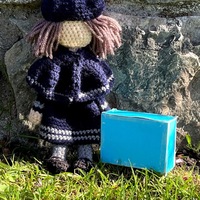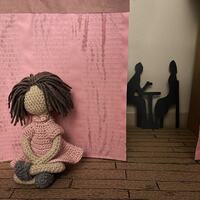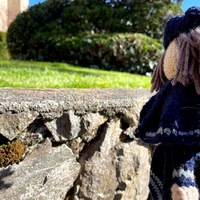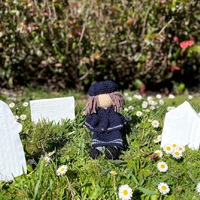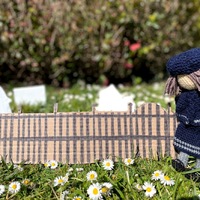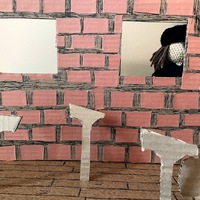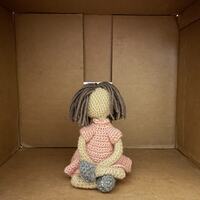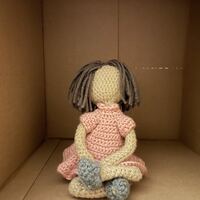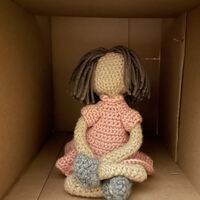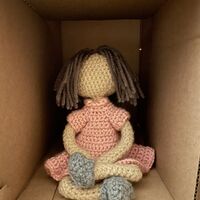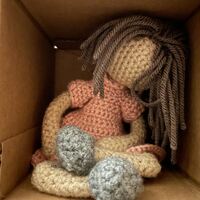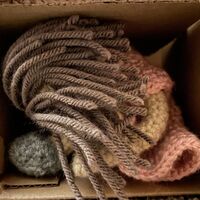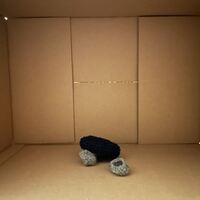Ilserl's Prague
In August of 1938, the Fränkel family consisting of mother Martha, father Emil, daughter Ilserl, and newborn Dorlly fled their home in Nazi-occupied Austria for the still free Czech capital of Prague. The city would be familiar to them, if only slightly, from visiting family, but for Ilserl--only seven at the time--the shift would have been major. She'd spent all seven years of her life in Linz-on-the-Danube, Austria, speaking German, going to school, and making friends. Now, she was not only fleeing for her life, but having to adjust to a new social structure and city, which would only be made harder by the occupation of Czechoslovkia by the Nazis in March of 1939.
A false sense of security began to take hold following the Nazi occupation (Wilkes 204). For about a year, everything remained relatively the same. And then, the restrictions began. The Nazis sought to exclude Jews from every part of public life, from movie theaters to public parks. Eventually, restrictions were passed on Jews' ability to own property or run businesses.
The reactions of the adults to their ever-changing situation were recorded through letters sent to their family--the Waldsteins--in Canada (where they'd immigrated shortly before the Nazis tightened immigration restrictions of Jews from Czechoslovakia) but the experiences of Ilserl can only be guessed at. The following dioramas are an attempt to bring forward how Ilserl, whose life was already upset from the move, might have experienced the increasing exclusionary decrees.
"Unfortunantly, the situation is getting more serious with each passing day. We rack our brains day and night, and if possible, we would leave tomorrow."
- Martha Fränkel (Ilserl's mother), April 2, 1939 (Wilkes 34)
The situation regarding possible escape from Nazi-occupied Europe is revealed to be grim in Martha's section of the joint family letter penned to the Waldstein family on April 2, 1939. Only a month after the Nazi occupation of Czechoslovakia, fleeing further into Nazi-unoccupied lands was incredibly difficult, if impossible. Martha mentions the possibility of going to Palestine, but wonders "well then, what happens to the children?" a thought most likely provoked due to the Zionist movements' focus on recruiting and smuggling able-bodied adults who could tend the land into Palestine (Wilkes 35).
Discussions on what to do next might have been overheard by Ilserl, now aged 8, as her parents sat in the kitchen or living room of their new home in Prague, facing life under Nazi occupation once more. Would she have snuck out of bed to sit by the door, staying up late to hear the anxious conversations of her parents? Would she have been nervous about the way the world was growing more and more dangerous around her? Would it have been frightening to hear her parents' anxiety?
Early antisemitic decrees banned Jewish people from public relaxation places, such as swimming pools and parks. One day, coming home from school (if the decree had yet to be passed banning Jewish children from schools) or perhaps shopping with her mother, Ilserl could have asked to go into the park and play with the other children. Her mother probably would have informed her that they were no longer allowed to go to the park, or the swimming pool, or the movies, or any other such place of recreation.
There was one place still avaliable to Jews for recreation though. Jewish cemeteries remained accessible to the Jewish community, and, in Prague, the Old Jewish Cemetery was used "for 'recreational' purposes" by many (Rothkirchen 102). Perhaps Martha took Ilserl and Dorlly there for a picnic, letting the girls roam among the graves. Maybe there were other Jewish children there at the same time and they could play together.
This freedom was cut off, though, on Februrary 2, 1943, when the keys to the cemetery were handed over to Nazi-affiliated authorities, most likely another deliberate move to further make life unbearable for the Jews (102).
"Ilserl is a big girl now. She has to study privately because there are no schools for our kind of people. She is being very reasonable about it."
-Martha Frankel, January 5, 1941 (Wilkes 184)
A Nazi decree eventually banned Jewish children from attending schools. Overnight, classrooms would have suddenly become far emptier, leaving several desks unattended. Ilserl's desk would have been one such desk. Would she still walk past her school on trips out in the city and look in to find Gentile students, maybe ones who used to be her friends, studying among the once fully occupied desk, and wish to be back among them?
From letters such as the one qouted above, we know that Ilserl was recieving private instruction and was, apparently, taking this exclusion as well as could be. But did she miss the company of other schoolmates? Who was tutoring her? Did she like whoever this was as a teacher? Was the educational standard similar to what she'd been used to? Of course, we will once again likely never know.
"Always something new, something else was forbidden, some unexpected limitation that made our life difficult, until bit by bit, life became impossible."
-Arnold [last name], July 11, 1945, (Wilkes 204)
The Fränkels moved from apartment to apartment in Prague as restrictions further limited their ability to earn money for rent. These accomodations would have become more and more cramped, especially as they moved in with extended family. Ilserl's public life was not only narrowing, but so too was her private life. In every way, her life was closing in on her until they was no space left for her to exist.
Citations
Rothkirchen, Livia. The Jews of Bohemia and Moravia: Facing the Holocaust. Lincoln: University of Nebraska Press, 2006.
Wilkes, Helen Waldstein. Letters from the Lost: A Memoir of Discovery. Edmonton: Athabasca University, 2010.
